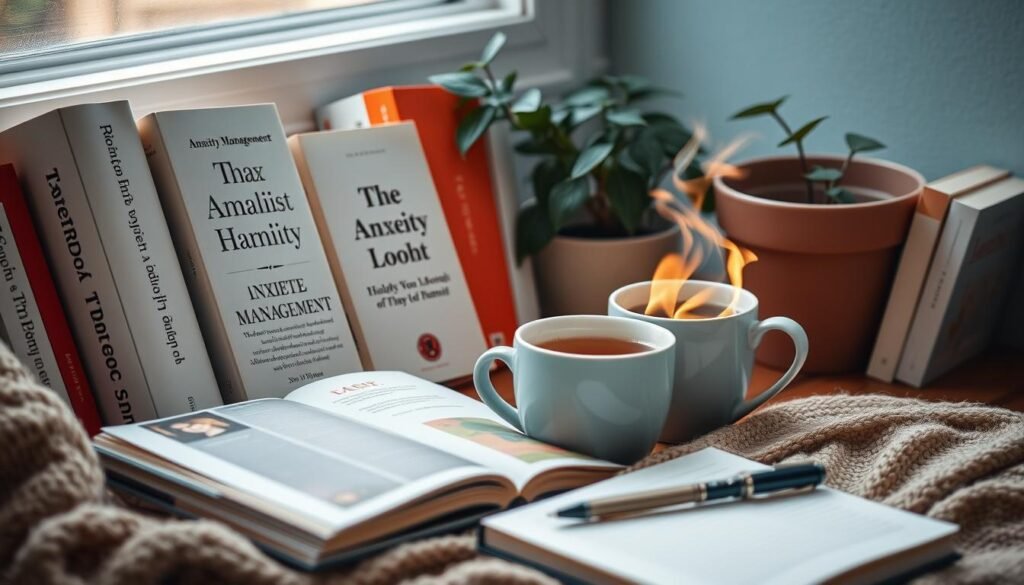Did you know about 40 million adults in the United States battle with anxiety? This makes it a top mental health issue many face. The good news is, some great books can help. These books offer new ways to handle fears and change thinking habits. Readers learn essential skills through these books, becoming better at handling anxiety’s challenges.
Key Takeaways
- Anxiety disorders affect around 40 million adults in the U.S., demonstrating the significant need for effective resources.
- Books about anxiety offer insights into coping mechanisms and understanding mental health challenges.
- Effective strategies include mindfulness, Cognitive Behavioral Therapy (CBT), and breathing exercises.
- Most reviewed books have high customer ratings, typically between 4.5 to 4.7 stars.
- Books are available in multiple formats, ranging from Kindle to paperback, making them accessible to a wider audience.
- Inclusivity and author credibility are essential factors in choosing the best anxiety management books.
Understanding Anxiety and Its Impact
Anxiety affects many people in different ways. It can make daily life and relationships tough. Many people find tasks harder to complete. The National Institute of Mental Health found that many deal with anxiety at some point.
Types of Anxiety Disorders
Different anxiety disorders create unique challenges. Generalized Anxiety Disorder (GAD) involves constant worry. Panic disorder impacts about 3.5 percent of Americans with intense fear episodes. Social anxiety disorder causes fear in social situations, especially among teenagers.
Recent data shows that 9.4% of U.S. kids aged 3 to 17 have anxiety. That’s about 5.8 million children. By 2016, nearly 6 out of 10 of these children were getting help. Anxiety can be linked to genetics, brain chemistry, and environment, showing it can run in families.
There’s a notable link between anxiety and depression. People with anxiety often face depression later. Understanding various anxiety disorders is key to effective treatment and coping. This knowledge aids in better recovery and wellness.
What to Look for in Books About Anxiety
Choosing the right books about anxiety is important for managing it well. It’s essential to check the author’s credentials. Someone with experience in psychology or mental health offers real insights. Also, books that focus on specific anxiety types or experiences can be more helpful. This includes issues like panic attacks and social anxiety.
Look for books that offer practical help, like Cognitive-Behavioral Therapy (CBT) or mindfulness methods. These strategies are proven to help reduce symptoms and improve coping skills. It’s also key that the book is easy to understand. This ensures readers can easily grasp its content.
Reviews from others who read the book can offer additional insights. Materials that are inclusive and cater to a wide audience are important because anxiety impacts people differently. Having different formats, like paperback or Kindle, makes these books more accessible.
Exploring expert-compiled lists, such as those from Lucy Foulkes, can show valuable trends. There’s a growing focus on workbooks for children and teens. This highlights the importance of early help and customized resources.

Exploring the Best Books on Anxiety Management
Many resources offer help for those trying to manage anxiety. The best books provide practical advice and therapy techniques. They cover different aspects of anxiety, so everyone can find something helpful.
The Anxiety and Phobia Workbook by Edmund J. Bourne helps with panic attacks and OCD. The Relaxation and Stress Reduction Workbook has helped people for over 30 years. It’s a top recommendation for easing anxiety.
The Shyness and Social Anxiety Workbook by Dr. Martin M. Antony uses a structured approach. It’s great for social anxiety. Declutter Your Mind by S.J. Scott shows how mindfulness can help with anxiety.
From Panic to Power by Lucinda Bassett shares personal tips and the power of positivity. Hardcore Self Help: F–k Anxiety by Robert Duff is more conversational. It’s a fresh way to confront anxiety.
There’s a wide range of anxiety books, from non-fiction to fiction. Notes on a Nervous Planet by Matt Haig gives insights on living with anxiety. Turtles All the Way Down by John Green shows a teen dealing with OCD.
Don’t Feed the Monkey Mind by Jennifer Shannon uses cognitive behavioral therapy and mindfulness. These books offer various paths to managing anxiety and finding relief.
Popular Books About Dealing with Anxiety
Books can be a big help for people dealing with anxiety. They offer stories, tips, and insights from therapy that many find relatable. These books give comfort and advice to readers.
My Age of Anxiety: Fear, Hope, Dread, and the Search for Peace of Mind by Scott Stossel is a top pick. It has an average rating of 3.86 and explores anxiety in depth, encouraging readers to face their fears. Another great choice is The Anxiety and Phobia Workbook by Edmund J. Bourne. It has a 4.07 rating and provides exercises to tackle anxiety’s challenges.
Hope and Help for Your Nerves by Claire Weekes is also recommended, with a 4.24 rating. It offers understanding and empathy for those struggling with anxiety.
- More To Life by Jacob Lasher – Average rating: 4.53
- Hardcore Self Help: Fk Anxiety by Robert Handly – Average rating: 3.99
- The Mind Shaman by Luca Bosurgi – Average rating: 3.41
These books are great for those looking for emotional support and helpful strategies. They show different ways authors tackle anxiety issues. For more book suggestions, check out this comprehensive list here.
Many readers have found these books very helpful. With nearly 40 million adults in the US affected by anxiety, choosing the right book can make a big difference in someone’s life.
Self-Help Books for Anxiety: Top Recommendations
Searching for the right self-help book for anxiety? There are over 214 titles available, offering something for everyone. These books, mostly in paperback format, make up 95.33% of the options. On average, they cost about $16.95. They aim to help you understand and deal with anxiety.
“Mind Over Mood, Second Edition” stands out with 1.2 million prints. It uses cognitive behavioral therapy to help readers. “Practicing Mindfulness: 75 Essential Meditations” is also popular, with over 6,000 reviews. It teaches useful mindfulness techniques.
For 30 years, “The Anxiety and Phobia Workbook” has been a go-to for anxiety help. It covers topics like panic, phobias, and worry. “When Things Fall Apart: Heart Advice for Difficult Times” offers great advice in short chapters.

Anxiety impacts at least 18% of U.S. adults, leading to a demand for diverse resources. These books, including for kids, teens, adults, couples, and seniors, cover various therapies. While only 4.67% are in digital format, physical books remain popular.
Best Books for Anxiety Relief Techniques
Many books on anxiety offer ways to ease it. They include mindfulness, breathing methods, and cognitive-behavioral therapy. Each book helps readers learn how to cope with anxiety.
The Anxiety & Phobia Workbook by New Harbinger Publications is a top pick. It’s now 33% off, costing $17 on Amazon. This workbook teaches various techniques for dealing with anxiety.
Stress-Proof Brain is on sale with a 40% discount. It shows how to be resilient against stress. Detox Your Thoughts by Chronicle Prism, at $16, fights negative self-talk, a key anxiety issue.
If perfectionism bothers you, check out Never Good Enough by Free Press. It’s $15, saving you 19%. The Worry Trick is available at Walmart for $14, after a 33% discount. It offers a new way to handle worry.
The Anxiety Toolkit is discounted by 28%, costing $13. It helps you find personal coping strategies. The Highly Sensitive Person also gives tips for sensitive people, with a 34% discount.
Learning about anxiety improves self-care. Experts like Jennifer Shannon and Seth Gillihan give key techniques. They teach how to identify and change worrying thoughts, aiming to improve anxiety management.

Anxiety Book Recommendations for Different Audiences
Exploring the right anxiety book depends on who will read it. Each book is designed for specific groups of people. This makes it easier to understand and manage anxiety.
Here are some top picks for various readers:
- Feeling Better: CBT Workbook for Teens – This book helps teens tackle anxiety with cognitive-behavioral techniques. It’s made just for them.
- Freeing Your Child from Anxiety – A guide for parents. It gives them ways to help their kids deal with anxiety. The book shares tips on building resilience and easing worries.
- Things Might Go Terribly, Horribly Wrong: A Guide to Life Liberated from Anxiety – Highly rated on Amazon. It’s a go-to for those wanting practical advice.
These self-help books are great because they connect with their readers. They offer help for specific issues, like social anxiety. They make readers feel seen and understood.
Reading fiction is also key in fighting anxiety. Studies show it lowers stress by up to 60% in six minutes. Fiction lets people safely explore stories. The brain sees these tales as if they’re real.
| Audience | Book Title | Focus |
|---|---|---|
| Teens | Feeling Better: CBT Workbook for Teens | Cognitive-Behavioral Techniques |
| Parents | Freeing Your Child from Anxiety | Tools for Supporting Children |
| General Readers | Things Might Go Terribly, Horribly Wrong | Practical Anxiety Relief Strategies |
Finding the right book is key. It leads to understanding and better coping skills. By following these recommendations, people facing anxiety can feel stronger and more in control.
Books About Anxiety: Notable Workbooks
About 40 million adults in the United States struggle with anxiety. It’s a big issue for many. Using anxiety workbooks can help those dealing with this challenge. These books provide tools and strategies for handling symptoms. They educate on anxiety disorders and encourage using therapeutic exercises.
Here are some great anxiety management books:
- The Anxiety and Phobia Workbook by Edmund J. Bourne helps with panic disorders, agoraphobia, and more. It offers strategies for different anxiety types.
- Retrain Your Brain: Cognitive Behavioral Therapy in 7 Weeks is a step-by-step guide. It shows progress with support from research.
- How to Be Yourself: Quiet Your Inner Critic and Rise Above Social Anxiety tackles the root causes of social anxiety. It helps readers face their fears.
- The Mindfulness Workbook for OCD uses mindfulness to combat OCD’s thinking patterns. It assists those struggling with OCD.
- Freeing Your Child from Anxiety provides great strategies for parents. It is crucial for families with anxious children.
These workbooks are vital for managing anxiety. They offer insights and methods for a range of anxiety issues. Reading these can help understand and reduce anxiety symptoms efficiently.
| Title | Author | Pages | Price (Paperback) | Published |
|---|---|---|---|---|
| The Anxiety and Phobia Workbook | Edmund J. Bourne | 528 | $25.95 | May 2020 |
| Retrain Your Brain | N/A | N/A | N/A | N/A |
| How to Be Yourself | N/A | N/A | N/A | N/A |
| The Mindfulness Workbook for OCD | N/A | N/A | N/A | N/A |
| Freeing Your Child from Anxiety | N/A | N/A | N/A | N/A |
Using these books can create a helpful space for dealing with emotional issues. They can guide in finding strategies that last and improve well-being.
Author Credibility in Anxiety Management Literature
When looking for the best books on anxiety, it’s crucial to consider author credibility. Books by credible authors provide dependable, research-backed methods for managing anxiety.
Authors with advanced degrees in fields like psychology have insights that are scientifically sound. These insights improve the help available to those with anxiety disorders.
Credible authors use their expertise in clinical settings too. This experience lets them understand mental health challenges deeply. Checking an author’s background ensures their advice is high-quality.
| Author | Background | Notable Work | Contribution to Anxiety Management |
|---|---|---|---|
| Dr. Judith Beck | Psychologist, Cognitive Behavioral Therapy Expert | The Anxiety Workbook | Promotes evidence-based cognitive strategies |
| Dr. Ellen Hendriksen | Clinical Psychologist | How to Be Yourself | Focuses on self-acceptance and social anxiety |
| Dr. Mark H. Maugans | Psychiatrist | Mindfulness for Anxiety | Integrates mindfulness techniques into practice |
Studies, such as the ones in this research article, show the importance of choosing the right literature for anxiety. People with anxiety should seek out books by credible authors. These authors offer proven approaches to managing anxiety.
How to Use Anxiety Management Books Effectively
To get the most from anxiety management books, you need to be active. People often start them hoping to beat anxiety. But, they don’t always dive deep into the lessons. Using these resources well involves adopting a few key habits.
Active reading boosts your grasp of the techniques in these books. Don’t just skim. Make it interactive by:
- Take notes while reading to remember important ideas.
- Try out the exercises in the book.
- Think about your own life as you read.
Anxiety self-help books are full of ways to tackle anxiety every day. They suggest journaling, being mindful, and imagining peaceful scenes. When you make these activities part of your routine, you start to see big changes. Your ability to handle anxiety gets better over time.
Talking to psychologists can add to the help these books offer. They know which books and workbooks do the best job. Their advice makes finding the best book for you easier.
By reading actively and using what you learn, self-help books become more than just books. They become a strong ally in your journey to manage anxiety better.
Conclusion
Choosing the right anxiety books is crucial for personal growth and healing. These top picks offer insights and ways to cope, drawing readers into a deeper understanding of their mental health journey. They explore thoughts that make our fears worse and triggers leading to panic. These books are more than just informative; they become reliable guides in managing anxiety.
Sonali Gupta’s work, for example, helps readers face myths and personal anxiety experiences. It educates on the importance of understanding one’s emotions, especially in today’s fast-paced world. By learning specific terms for emotions, readers can better handle anxiety in an often overwhelming and complex world.
Turning to these books, individuals find support in understanding and managing anxiety. By engaging with these texts, they gain tools that improve their mental well-being. This shows the powerful impact literature has on managing anxiety today.